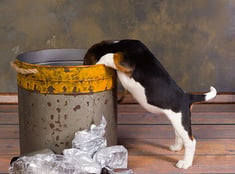Did you know that March 15th through the 21st is Poison Prevention Week? As a member of our Best Friends family, we want to help you keep all of your furry family members safe so here are a few tips on how to keep an accidental poisoning from happening in your home.
As a pet parent, you probably already know that your pets are very curious and like to get into things. One of their favorites is the trash can. If you can’t keep these out of site in a cabinet, then be sure all trash cans and diaper pails have locking lids. Move any open storage containers to a closet or up to a high shelf.
 Prevent accidental pet poisoning. Keep your pets safe with these helpful tips.
Prevent accidental pet poisoning. Keep your pets safe with these helpful tips.
Also remember, just because the medication lid says “child-proof”, doesn’t mean it will be dog proof. Accidental ingestion of over-the-counter or prescriptions medications is a common reason that pets are brought in to the emergency room, so be sure to keep all of these out of reach at all times.
Other potential hazards that pet owners often forget about are backpacks and purses. These may contain medications or sugar-free gums or candies that can be toxic to pets, so be sure to keep them off the floor and out of reach as well.
Don’t forget to dog- and cat-proof the garage or floor level cabinets where you store cleaning supplies or solvents. If your pets spend any time in the garage, be sure all of these items are stored out of reach. Cabinets should be locked or securely fastened with baby-proofing latches to keep them from being pried open by curious paws. If any of these chemicals are spilled, be sure to clean up the spill right away. This is especially true for antifreeze which can be fatal if ingested (or even licked off of wet paws).
Prevention is the best medicine but, if you do have a pet emergency, be prepared. If it’s not already in there, put your veterinarian’s number in your phone so you don’t have to look it up in the event of an emergency. Another good resource to have at your disposal is the Pet Poison Helpline. This site has a comprehensive list of pet poisons and provides consultations (for a fee) in the event of an intoxication.
If you suspect that your pet has ingested a toxin, call your veterinarian right away. If you can tell them exactly what your pet ingested, they can do a better job of telling you what to do, so be sure to have the bottle or packaging handy if you can. It’s also important to be honest about what your pet may have gotten into. An emergency is not the time to be embarrassed or afraid of what your vet may think.
DON’T induce vomiting or give your pet a home remedy until you talk to a veterinary professional – you can sometimes do more harm than good. If your pet vomits on their own and you aren’t sure if what they ate is toxic, be sure to collect any packaging or plant material they throw up so you can describe it or show it to the vet.
As anyone who has been a pet parent knows, our pets can be mischievous and get themselves into trouble. Your best defense is to be proactive and vigilant about their surroundings so that you can prevent an accidental poisoning.
If you have any questions or concerns, please contact your nearest Best Friends veterinarian. For a list of our locations, please visit our locations page.




